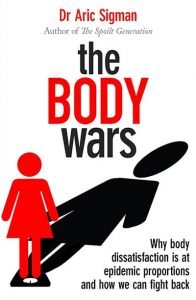Girls and woman of all ages have never been more unhappy with their bodies. And research shows that slim women are often no more satisfied with their bodies than overweight ones. Forty years after the debut of body politics, fat is more a feminist issue than ever. So why has body dissatisfaction become the norm? Children as young as 3 years of age worried about their appearance? Why are eating disorders, weight and shape concerns affecting so many women? And what can we do to deal with the negative effects this is having on people’s lives?
Leading psychologist Dr Aric Sigman tackles body dissatisfaction in a direct, uncompromising way in his latest book, The Body Wars. He examines the leading research, identifying key issues, and calls on the untapped army of husbands, partners and fathers to come out fighting to help change the way girls and women feel. The Body Wars also offers clear, practical solutions for individuals, parents and society to help reduce and prevent what is fast becoming a world-wide epidemic. In this extract, Dr Sigman discusses the ‘body after baby’ phenomenon…
Misery Mumoirs
When women become mothers, they are often portrayed as creatures who gain a baby, and lose a brain. They are said to talk predominantly about changing nappies – as if by talking about nappies a mother is rendered incapable of talking about anything else. Moreover, it becomes increasingly difficult to see the reality that this aspect of motherhood is something you surrender to for a limited period of time during which you may well be immersed in nappies. Motherhood is portrayed as a cul-de-sac along the avenue of real life. Once you set off on that road trip there is an incessant ambient pressure to get back to normal life, ‘real’ life. Yet giving life is surely about as real and raw as life gets.
The recent transition to greater self-expression has allowed many mothers to write about their feelings and the problems of pregnancy and motherhood to a degree and depth unthinkable only a generation or so ago. This is helpful to those who are reassured that they are not the only ones less than entirely happy with their current state. Or as the late commentator Cathy Crimmins shared, ‘A period is just the beginning of a lifelong sentence’. The highlight of this lifelong sentence is shared by another happy mum, Sherry Glaser who offers these comforting words to prospective mothers: ‘I realise why women die in childbirth – it’s preferable.’
Yet for most women motherhood is relatively uneventful, characterised by its mundaneness. And so the snappy, sharp ‘if-it-bleeds-it-reads’-style pieces written by media-mom columnists do not reflect the real lives of most mothers in most countries, the majority of whom derive much of the meaning of their lives from being mothers. How awful.
To add insult to injury, many mothers feel less attractive and less interesting. It seems as though they feel that if they were working again, they would regain control over their lives, along with the esteem that has gone missing. And there are ubiquitous role models to help this process along. Given the way appearance and form have taken precedence over deeper content, the image of the modern, slender, well-dressed and groomed professional woman in heels, toting an iPhone 5, while sliding into her new VW Beetle is sleek, up-to-date and aspirational. And as a snapshot of success and empowerment, it is more persuasive and seductive than a tired mother in a smock with baby poo on her right thumb.
If men were to undergo all of the above changes and experience the negative or ambivalent feelings associated with them, they might react with erectile dysfunction or perhaps even a mass killing spree of the type we see on the news. But in women this can be subtly expressed through body dissatisfaction.
A Rebirth of Motherhood
Despite growing evidence that body dissatisfaction is prevalent among pregnant women,and that it is linked with a range of not so very nice effects on women’s health(including depression, obesity and excessive pregnancy weight gain for the mother, as well as unhealthy eating behaviours that can negatively impact on the unborn child’s future health and development), it has, until recently, been largely ignored by healthcare professionals working with pregnant women. This will hopefully change further as awareness is growing
Our grandmothers wouldn’t have needed the difference between their bodies before having children and after explained to them in sensitive detail. But now doctors are adamant that it is important to educate women about the bodily changes, including weight gain and the realistic expected course of postnatal weight loss and further changes, and to find ways to enhance a mother’s body image and self-esteem after she gives birth.
Changing society’s and individual women’s perceptions of pregnancy and motherhood will take time and pressure, but I believe a change in focus and perspective can be achieved. And a change in perspective (and expectations) may have significant effects on the way women view their bodies in future. An interesting insight into this process was revealed in a study by the Department of Woman and Child Health at the Karolinska Institute, Stockholm, where body dissatisfaction in women who became pregnant through IVF was compared with those who became pregnant without it. Interestingly, women previously told they were otherwise infertile, yet who then became pregnant through IVF treatment ‘experienced their pregnancies in a less negative way. IVF women were less negative about their pregnant body and they were also less worried about possible “loss of freedom” in their future lives as parents.’
Think about it, from gay people to disabled people, we have revolutionised the way society views a wide variety of groups of human beings and themselves. Given that more than half the world’s population are female and most have been, are or will be pregnant, there is an overwhelming vested interest in a revolution in our view of pregnancy and motherhood from the top (politically) down. Mothers of young children are usually busy, tired and overstretched and therefore don’t have the political voice their number and role deserves. We have to ensure their voice is heard and that our governments are fitted with a hearing aid with the volume turned up loud.
If body dissatisfaction has functioned as a voice expressing unease over the changes women have recently experienced and the many anxieties they understandably have over motherhood as undermined by our culture, it isn’t just their feelings and wellbeing today that are at stake. This current devalue system may also set in motion a maternal role-modelling effect in which children learn that pregnancy and motherhood are not physically attractive and that mothers like themselves less and loathe their bodies more because of them.
If body dissatisfaction has served as a lightning rod for maternal conflict, it’s time to stand up and give those responsible a deadly shock.
About Dr Aric Sigman
Dr Aric Sigman specialises in child health education. He is a Fellow of The Society of Biology and Associate Fellow of The British Psychological Society. His health and psychology book Getting Physical won The Times Educational Supplement’s Information Book Award. His biology paper on the biological aspects of media, body image and dieting, ‘A Source of Thinspiration ‘, was selected as the ‘2012 Scientific Article’ for Britain’s GCE Biology A-level exam. He’s written for the Times Educational Supplement and his books Remotely Controlled, The Spoilt Generation and Alcohol Nation have caused ongoing public debate. He travels frequently to observe health issues in various cultures including North Korea, Republic of Congo, Turkmenistan, Bhutan, Mali, Tonga, Burma, West Papua, Laos, Iran, Vietnam, Bolivia, Burkina Faso, Far Eastern Siberia, Sumatra, South Korea, Cambodia, Chile, Philippines and others.
This is an edited extract from Body Wars: Why body dissatisfaction is at epidemic proportions and how we can fight back by Dr Aric Sigman, published by Hachette Australia, RRP $32.99′, available on Booktopia









We appreciate your comments Amelia.